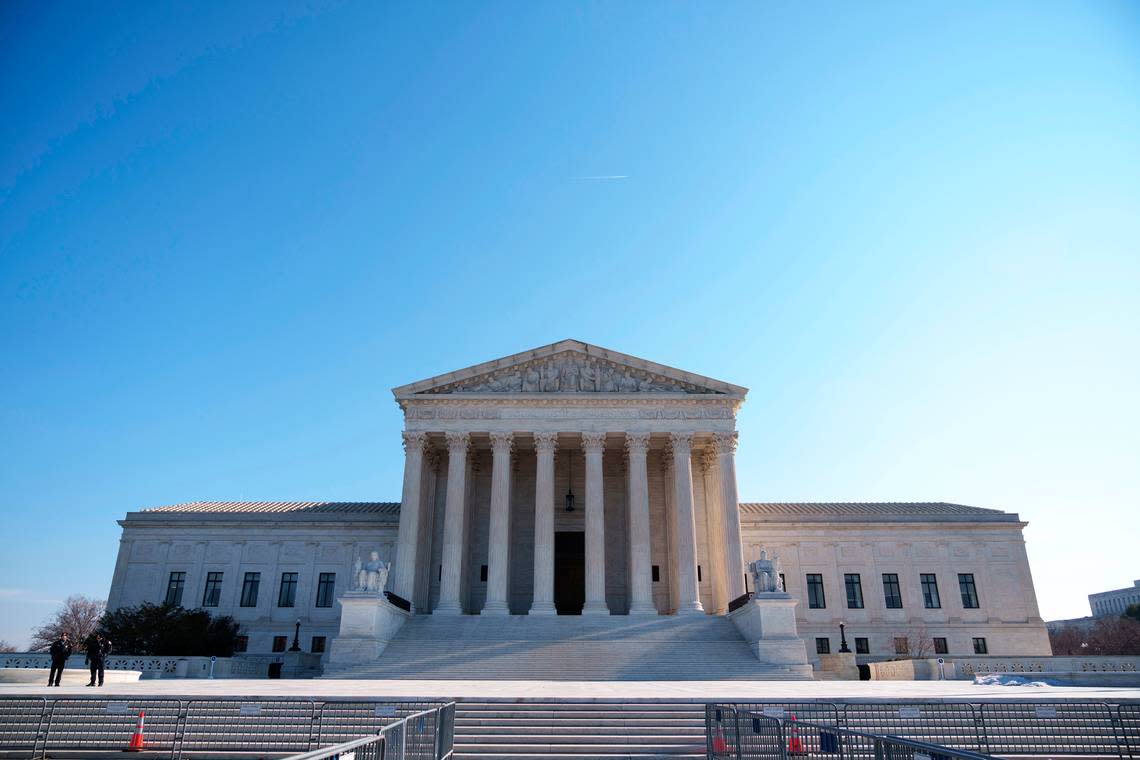’My dad would say now is the time:’ Why MLK III supports expanding the Supreme Court
The Rev. Al Sharpton and Martin Luther King III have joined calls to expand the U.S. Supreme Court under the backdrop of an impending case that is expected to restrict or end the use of race as a factor in college admissions.
During a Tuesday press conference in Chapel Hill, Sharpton and King cited the case as further proof of why expansion was necessary.
The case, Students for Fair Admissions v. University of North Carolina, could transform admissions practices at colleges and universities across the country. It looks at whether UNC’s use of race in admissions violates the equal protection clause of the 14th Amendment.
The impending ruling from the Supreme Court, which has shifted politically to the right in the past few years, comes after a series of recent consequential decisions — including on abortion and gun rights — and public scrutiny into the court’s ethics rules after revelations that Justice Clarence Thomas did not disclose lavish gifts from billionaire Harlan Crow.
In response, some Democrats and progressives, including members of Congress, have made calls to expand the Supreme Court, in hopes of allowing President Joe Biden to appoint more liberal justices to supplant the current 6-3 conservative majority.
Impending affirmative action decision
“When you see a court based on partisanship take away a woman’s right to choose, and may take away affirmative action, and may take away other rights — it’s time for us to expand the court to expand the options of justice and civil and human rights,” Sharpton said.
The press conference was part of a national bus tour by the “Just Majority” campaign, which calls for what it says are Supreme Court reforms, including expansion. It took place in front of the Chapel Hill Nine marker, which commemorates nine high school students who held a sit-in at the whites-only Colonial Drug Store in 1960, helping ignite the Civil Rights Movement. Sharpton, King and his wife, Drum Major Institute Director Arndrea Waters King, were joined by Chapel Hill Mayor Pam Hemminger and professor Kermit Roosevelt, a former member of Biden’s Supreme Court commission.
“That’s what affirmative action is: it’s an attempt to make good on the promise that we won’t have a society based on racial class,” Roosevelt said. “This Supreme Court doesn’t represent the views of most people. It represents an extremist minority that managed to take an oath, and that’s not right.”
Polls on affirmative action show mixed results. A Washington Post-Schar School poll finds that 63% support banning the consideration of race in college admissions. A Pew Research poll shows 74% of Americans do not think race or ethnicity should be a factor in college admissions decisions. However, a more recent poll by the Associated Press-NORC Center for Public Affairs Research finds that 63% of Americans don’t think the Supreme Court should ban affirmative action, perhaps reflecting the way the wording of questions affects responses.
“The court could wreak havoc on the ability of minority students to attain an education that puts them on an equal playing field with their people,” Arndrea King said. “Democracy is not about special rights. It’s about the right to exist. It’s about equality of opportunity.”
Expand the Supreme Court to 13?
A bill that would expand the Supreme Court by four seats to a total of 13, the Judiciary Act of 2023, was introduced in the U.S. House of Representatives in May. It currently has 62 co-sponsors including Rep. Valerie Foushee, who represents Chapel Hill in Congress. During the press conference, Sharpton called on people to contact their representative to support the bill.
Given the Republican majority in the House and insufficient support in the Senate, passage of the bill is highly unlikely.
“I think my dad (Martin Luther King Jr.) would say now is the time, as he said many times throughout his leadership,” King III said.

Sixty years after King’s March on Washington, the country is not near what his father would have achieved, King III said.
“We often went to the Supreme Court for relief over the years and, by and large, the court looked forward,” he said. “But, after the Dobbs decision in 2022, it took away women’s rights, it chose to look back and take a dramatic step backward.”
The Supreme Court has been expanded a number of times throughout history, and the current nine-seat limit is not enshrined in the Constitution. The last time the seating on the Supreme Court changed was in 1869, when it was expanded from seven to nine.
Opponents of adding seats to the court include Republican Sen. Thom Tillis of North Carolina, who has backed a constitutional amendment to limit the court to nine justices or fewer.
“It’s no secret that Democrats want to pack the Supreme Court with radical, activist judges who will legislate from the bench and turn the Court into a rubber-stamp for left-wing policies,” Tillis said in a statement in March.
Elected officials in North Carolina who have endorsed Supreme Court expansion include Hemminger, state Sen. Natalie Murdock and three Durham city council members.
“Elections have to mean something. And the 6-3 majority we have on the Supreme Court now, they were put there by people who lost five out of the last eight presidential elections, who lost the popular vote seven out of those eight times,” Roosevelt said. “If we don’t do something about it, they’ll be in control for the next 40 years pushing their extreme views on the American people, even if they keep losing elections.”
